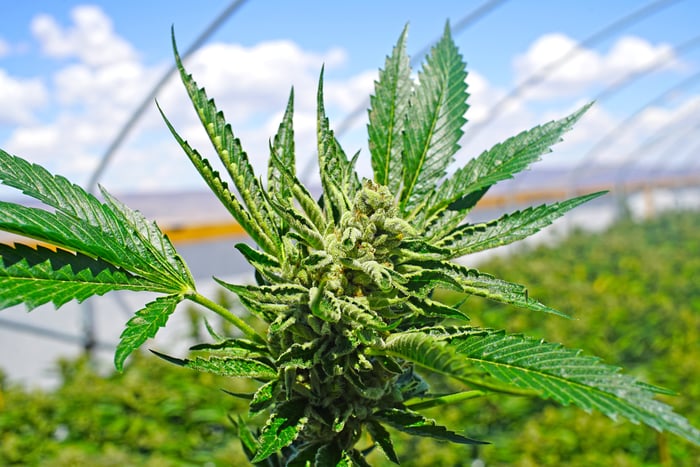Legal marijuana is one of the consistently quickest-growing industries on the planet. According to research firm ArcView, legal cannabis in North America grew by 34% in 2016 to $6.9 billion, and it's expected to continue growing by an average of 26% per year through 2021, leading to an estimated market of $21.6 billion. That type of growth is tough for marijuana stock investors to ignore.
Expansion of legal weed has played a big role in these rapidly growing sales figures. Mexico legalized medical cannabis in June, while our neighbor to the north, Canada, gave the green light to medical cannabis all the way back in 2001. In fact, a number of larger medical cannabis players in Canada have been generating positive EBITDA (earnings before interest, taxes, depreciation, and amortization) solely because of medical cannabis patient growth.

Image source: Getty Images.
We're also seeing a big shift in the way the public views marijuana, especially in the United States. National pollster Gallup, as well as CBS News, both found in their respective polls this year that the number of respondents in favor of seeing cannabis legalized is at an all-time high. Presumably, the more public support the pot industry receives, the more likely it is that the U.S. federal government would consider rescheduling the drug.
Canada is leading the way
But of all the countries exhibiting the best growth, Canada takes the top spot among marijuana stocks. Aside from its burgeoning medical pot business, overseen by Health Canada, Prime Minister Justin Trudeau introduced legislation in April 2017 to legalize recreational weed by July 1, 2018. With progressives in control of Canada's parliament, and tax-sharing disagreements now in the rearview mirror between the federal government and the individual provinces, it's looking more likely that Canada could become the first developed country to legalize recreational marijuana.
Thus, investors have been focusing a lot of their attention on Canadian pot stocks -- and rightly so. As noted, a few of the larger market-share holders have already been marginally profitable on the basis of medical cannabis sales, and would stand to be major beneficiaries of a recreational pot law being passed.

Image source: Getty Images.
However, it's the smaller players that could prove to be the most intriguing to investors. One such company has ambitions of more than doubling its current growing capacity and hitting the ground running if recreational cannabis becomes law in Canada. Ladies and gentlemen, say hello to OrganiGram Holdings (OGI -1.36%).
This small-cap marijuana stock is aiming big
In a country dominated by four major players, OrganiGram is trying to stake its claim. In October, the company announced, via a $39.3 million bought-deal offering (this is where common stock is sold to an investment firm or institution prior to the release of a prospectus), that it was aiming to boost its production capacity to 65,000 kilograms of cannabis annually, up from 20,000 kilograms. It would do this by expanding production at the Moncton location, adding 255,000 square feet of growing capacity, and bringing the company's total square footage to 429,000 at this site. According to CEO Greg Engel, "One of our key operating philosophies is to keep production costs low by centralizing operations. The simplicity of a single site is part of our focused approach on achieving the highest earning-per-gram in the industry. These production efficiencies will deliver tremendous shareholder value."

Image source: Getty Images.
In addition, OrganiGram has done a good job of expanding its product portfolio beyond just traditional dried cannabis. While dried cannabis is often in the highest demand, it has generally lower margins relative to extracts and cannabis oils. The company's bought-deal offering refuels the company with cash to expand its portfolio to offer these higher-priced, and higher margin, products.
It's also been given the OK by the New Brunswick provincial authority to supply a minimum of 5 million grams of dried cannabis a year to cover recreational-pot demand, assuming legalization. This would generate an estimated $31 million to $47 million in annual sales for OrganiGram.
But keep these risks in mind
However, no matter how "green" the industry looks, there are always risks -- and OrganiGram is no different.
For instance, the company lost nearly $8.6 million in fiscal 2017, reversing a very small profit from fiscal 2016. This loss was a result of heavy investments in expansion, including a near doubling in general and administrative expenses, and a veritable quadrupling in share-based compensation. In fact, since inception, the company has an accumulated deficit of roughly $15.5 million. Making money isn't exactly its forte at the moment, which should worry all investors.

Image source: Getty Images.
OrganiGram, like practically every other Canadian-based pot stock, also relies heavily on bought-deal offerings to fund its expansion. Since most of these companies don't have enough cash flow to cover organic expansion, these growers have reverted to selling shares of common stock via bought-deal offerings to raise capital. Though they've had no issue in doing so, it does mean that existing shareholders are being diluted quite a bit. In just a year's time, OrganiGram's shares outstanding jumped by almost 66% -- and this doesn't count the latest bought-deal offering noted above.
OrganiGram may struggle to gain traction and pricing power as well when up against high-visibility brands like Canopy Growth Corp.'s Tweed, or MedReleaf's higher-end cannabis oil products.
Success isn't a guarantee just because this is a "marijuana stock." Nonetheless, the biggest gains could come from those companies that are able to emerge from the shadows. Make sure OrganiGram Holdings is on your radar.





